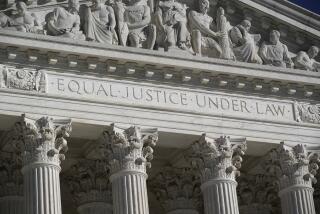Keep judges clean
- Share via
THE AMERICAN BAR ASSN. is having some sound second thoughts about weakening a key provision of its Model Code of Judicial Conduct, which traditionally has served as a guide to state court systems in setting their own ethics rules.
An ABA drafting panel had been criticized -- including by this editorial page -- for proposing changes that would have diluted a provision saying that judges should avoid even the “appearance of impropriety.” But now the panel is expected next week to accept a “friendly amendment” to its own proposal at an ABA meeting in Miami, one that would undo the damage.
Canon 2 of the current ABA code says that judges “shall avoid impropriety and the appearance of impropriety in all of the judge’s activities.” The panel’s proposed revision would have kept the admonition about avoiding the appearance of impropriety, but it would have added language suggesting that a judge could be disciplined only if he committed an actual impropriety. The effect would have been to make the “appearance” provision nonbinding.
Advocates of the proposed change had argued that “appearance of impropriety” was too spongy and subjective a standard. But the current code makes it clear that “the test for appearance of impropriety is whether the conduct would create in reasonable minds a perception that the judge’s ability to carry out judicial responsibilities with integrity, impartiality and competence is impaired.”
That language is adequate to protect judges from being punished for behavior that only an eccentric or self-interested individual would find suspicious. It tracks language in California’s Code of Judicial Ethics saying that “a judge shall avoid impropriety and the appearance of impropriety in all of the judge’s activities.”
Critics of the proposed rule change, such as the American Judicature Society, acknowledge that judges are usually removed or disciplined for conduct that goes beyond creating an “appearance” of impropriety. But the “appearance” language has served the additional purpose of making judges think twice about potentially compromising situations and err on the side of preserving public confidence in the court.
Avoiding the appearance of impropriety should remain a commandment for judges, not be demoted to a mere suggestion. The ABA should make clear next week that it has gotten that message.


